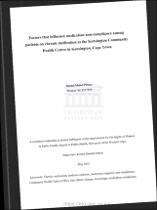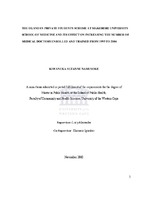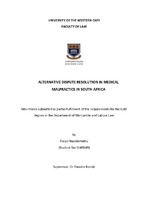| dc.contributor.advisor | Rendall-Mkosi, Kirstie | |
| dc.contributor.author | Prince, Deidre Mabel | |
| dc.date.accessioned | 2022-09-19T09:53:57Z | |
| dc.date.available | 2022-09-19T09:53:57Z | |
| dc.date.issued | 2003 | |
| dc.identifier.uri | http://hdl.handle.net/11394/9307 | |
| dc.description | Magister Public Health - MPH | en_US |
| dc.description.abstract | Failure of patients to comply with medication regimens is a major barrier to the delivery of effective medical care. Measures to improve compliance must be based on knowledge of the reasons why patients are not compliant. In this mini thesis ,a non-intervention study was employed to identify as ample of patients on chronic medication at the Kensington Community Health Centre(CHC)who were non-compliant and to established the factors that influenced their non-compliance using exploratory and descriptive methods. The initial sample was selected by reviewing records of patients on chronic medication attending the facility on 3 consecutive days and patients who displayed a trend of missing appointments were selected. It needed to be established whether these patients were indeed non-compliant. These patients were therefore interviewed using a structured questionnaire. The categories covered by the questionnaire were educational background, socio-economic background, understanding of the illness, understanding and administration of medication and service-related factors. 97o/o of the patients were found to be non-compliant and the factors identified as influencing this non-compliance were further explored in the patient and staff interviews. Semi-structured in-depth interviews were then conducted on the patients found from the
questionnaire to be most non-compliant. Staff members were also interviewed. This provided information about the knowledge, attitudes and practices of non-compliers and identified contributor service-related factors' The results from this study revealed that patients had a severe lack of understanding of their medical conditions as well as medication regimens. Factors that affected medication
non-compliance at this CHC included medication side effects forgetting and poor communication between the health care provider and the patient. The mini thesis was concluded with recommendations that may be used to improve the success of patient treatment as well as to reduce the state expenditure on medication which non-compliance can induce. The recommendations were based on strategies to
improve patients understanding of their medical conditions and medication regimens. The results of this study suggested that non-.compliance should be closely monitored by the CHC and a simple method like written reminders could be employed to recall non compliant patients. The findings of this study can help to guide managers and stakeholders to improve patient compliance at the Kensington CHC. This may be useful to understand and attempt to solve medication non-compliance in other communities. | en_US |
| dc.language.iso | en | en_US |
| dc.publisher | University of the Western Cape | en_US |
| dc.subject | Chronic medication | en_US |
| dc.subject | Medical condition | en_US |
| dc.subject | Medication regimen | en_US |
| dc.subject | Non-compliance | en_US |
| dc.subject | Community Hearth centre (CHC) | en_US |
| dc.subject | Side effects | en_US |
| dc.subject | Dosage | en_US |
| dc.subject | Knowledge | en_US |
| dc.subject | Medication compliance' | en_US |
| dc.title | Factors that influence medication non-compliance among patients on chronic medication at the Kensington Community Health Centre in Kensington' Cape Town | en_US |
| dc.rights.holder | University of the Western Cape | en_US |




